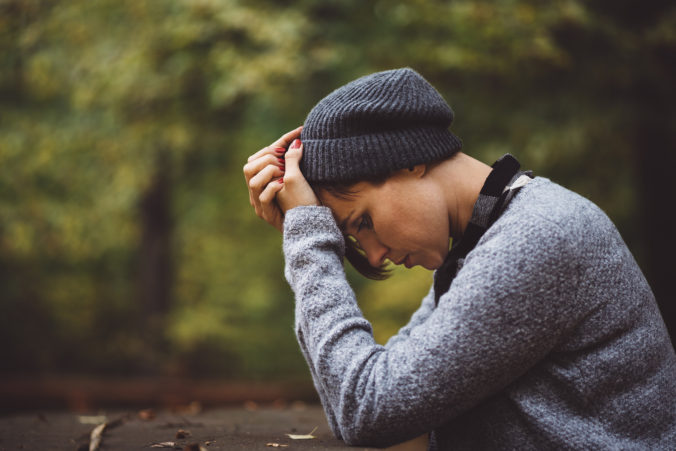Several months ago, I was going through a stack of old pictures with a new friend.
My intention was pretty innocuous: I wanted to show her examples of the ever-changing hairstyles and colours of my youth, during which I’d gone through every possible natural hue under the sun, along with a good measure of completely unnatural ones too.
I actually had a pretty good time finding these old pics and the memories that went with each and every one of them.
Often, when we are busy with our daily grind, we forget to take the necessary step back to remember the vastness of our experience, so opportunities like that one — even when they’re motivated by essentially superficial reasons like hair research — can be truly valuable.
Still, when I landed on this picture, I stopped and visibly cringed.

“Oh, don’t! You’re so pretty there!”, she said sweetly.
I stopped her quickly. See, what was reflected in this picture for me had nothing to do with aesthetics. Looking back at me was a deeply broken, emaciated young woman, not allowing herself to ask for help. Not only was I, around that time, at my lowest weight ever, I was at my lowest low.
THAT COULD NEVER HAPPEN TO ME!
You know how it is: we hear about others in dire situations, read about them or watch fictionalized accounts on television, and as much as our heart goes out to them, there’s that little voice in the back of our mind: but that would never happen to me!
We all do this to some degree or other, believing ourselves immune to certain situations, staunchly believing ourselves strong/aware/discerning enough that we’d never find ourselves in such horrific circumstances.
Except that’s not quite how life works.
Ever hear of the boiling frog metaphor? It started as an anecdote explaining that if you put a frog in boiling water, it will immediately try to escape, whereas if you put it in cold water and very slowly bring it to a boil, it won’t take notice and so will stay put to eventually be cooked alive.
Even though the science behind this reasoning is shoddy at best — and I’m not in any way condoning the boiling of live frogs — it still serves as an apt metaphor.
When faced with something terrible, it’s easy to turn ourselves away, but when we are in a situation that, ever so slowly, gets progressively worse, escape isn’t that easily achievable.
And so it never even occurred to me that I could find myself in an abusive relationship. Surely, that didn’t happen to women like me, right?
Yet all the signs were there: I was continually terrified at the perspective of my partner’s outbursts, which despite all the care I took not to provoke, kept coming under ever-surprising situations and at an alarming rate; I was increasingly isolated from my friends and family, with my schedule scrutinized by the minute and any lateness (we’re talking in the 5-to-15-minute realm) would result in me paying the consequences; I was consistently being put down, mentally and physically, and essentially being told that my body wasn’t mine to do as I pleased.
But that could have never happened to me, right?
WHEN CONTROL GETS OUT OF CONTROL
Domestic abuse is essentially all about control. I could go on about the specifics, but I want to let a more professional voice go into more detail in the matter, and therefore invite you to read the brilliant article written for Girls Gone Strong by Lisa Borchardt, LCSW, on this question.
I can, however, talk about my own experience.
Faced with the rapidly diminishing control that I had over my own life, I found myself grasping at the very few straws left, as the areas in which I still had some measure of agency were few and fragile.
Food consumption was one of them.
Without fully realizing what I was doing, I stopped eating normally, going from three meals a day to two, and then to one. As I ignored hunger pangs, quelling them with coffee and cigarettes, there was a part of me that felt… virtuous. If I was able to show such restraint, such discipline, surely I wasn’t a wholly bad person, was I?
I was quickly becoming a shadow of myself, and yet I persisted: maybe I could reach a state where I was so ethereal that no one could find fault in me anymore.
Ultimately, I was trying to disappear.
But, try as I might, I never managed to make myself small enough.
Thankfully, I was eventually able to get out of this relationship. Someone reached out to me at the right moment, a moment where I was able, in a desperate surge of self-preservation, to reach back and grab the hand that had been extended to me.
SHAME, THE SOUL-EATING EMOTION
In French, my first language, the notion of survivor of abuse isn’t commonly used. Victim is still very often the go-to word. Because of this, for an overwhelmingly long time, I struggled with this label of victim of intimate partner violence.
I probably don’t need to tell you how much shame, how much sadness and how much anger were attached to this identity. But I’d felt forced to take it on, because of what had happened to me and how it now coloured my life and my interactions. I resented it with every bone in my body.
In a society where victim-blaming is still definitely and unfortunately a very pervasive thing, speaking out about our dark experiences definitely isn’t compelling, even well after the fact.
Shame keeps us silent.
Shame keeps us pliant.
Shame keeps us where we are, even if it’s slowly killing us.
It took years for my disordered eating behaviours to come back in the realm of normalcy. It took longer for the rest of the damage to unfold and even longer yet for me to agree to deal with it — always slowly, always compassionately.
A few of years ago, in a professional context, I stumbled upon the concept of survivor. It was jarring, as I’d never thought of it this way. And while being a survivor certainly felt much truer than that old identity of victim which I loathed, I soon came to realize that I didn’t really know how to be a survivor.
And this is why we need to speak out.
This is why we need to reach out.
This is why we must put an end to that cloak of shame.
If you are currently in an abusive relationship or know someone who is, please know that you not alone. I want you to know that you can reach out for help.
In the USA: http://www.thehotline.org/
In Canada: http://www.sheltersafe.ca/
Don’t miss a single thing! Add yourself to my FREE Special Crew by clicking right here!

